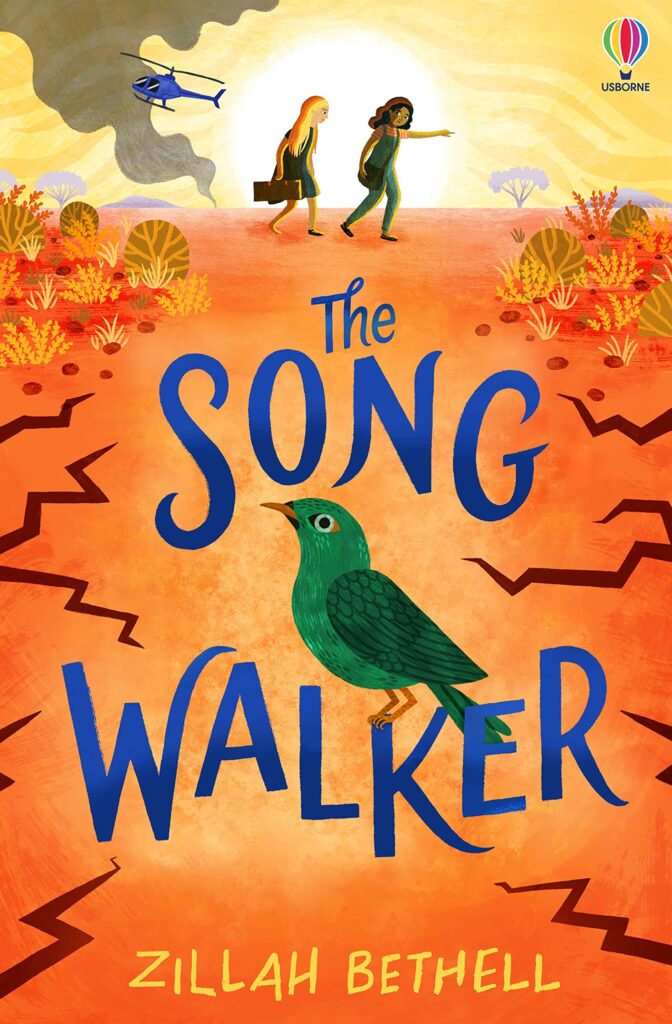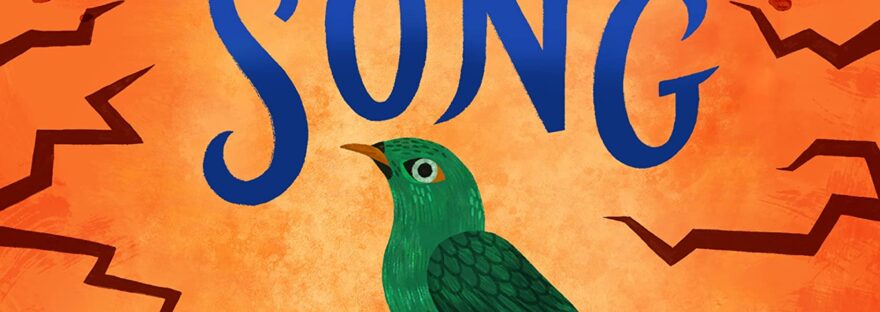By Zillah Bethell (published by Usborne Publishing, 2023)
The bottle is removed from my lips. I try calling out for it to be returned, but then a hand – wet with water – runs over my brow, cooling my forehead. It feels so good.
“Wait here,” the voice says. “I will be back soon. A few minutes. Don’t move.”
I hear feet scrunching against the dirt. Running. Away from me. I raise my arms in the air. Please don’t go, I try saying, but nothing comes out of my mouth. Please stay. Don’t leave me alone here.
A young girl wakes in the middle of a vast desert. She is dishevelled, wearing a single shoe and a soft, black dress that does not belong in this landscape, and is carrying a heavy silver case. She also has no memory of who she is or how she got there.
When she is told by the enigmatic Tarni, who rescues her from a snake, that they are in the middle of the Australian outback, everything seems hopeless. But together they will keep moving through the desert until they find what Tarni’s looking for – and hopefully the girl’s memories as well.

The Song Walker is a difficult book to describe, especially while avoiding spoilers! The setting is like something from an epic wilderness tale but, although the stakes are high, the problems and relationships all feel so personal.
It’s set in the Northern Territory where the Alyawarre live, one of the Aboriginal Australian groups, although the girls are specifically travelling through the Australian Outback so the number of people they see is relatively low.
Memory loss can be a hard topic to write about, but one of the greatest benefits of it is that it gives us the opportunity to learn alongside the main character. Not only about the landscape that she is moving through – we could have got that anyway as it would still be new to her – but about who the character is herself. What does she spend her time doing? Who does she care for? Is she a good or bad person?
Both Tarni and our unnamed point-of-view character have strong personalities that can lead them to clash at times. Even when at odds however, it becomes evident that they care for one another. While the latter is lost on how to survive or what to do, Tarni is incredibly self-sufficient and outgoing, pulling both us and the girl along with her.
Tarni is also quite secretive as to what she’s doing and where she’s going, leaving us with one person who doesn’t want to share, and one who simply can’t. They both open up as the story progresses and as the latter’s memories slowly return, though it isn’t until the very end that we are told the final truths about each of them.
Every person they meet along the way has something to offer them, for good and bad, and each of them is integral to our protagonists’ journey, which becomes much clearer at the end once we can see the whole picture.
One of the best things I found about the book was the way the history and beliefs of the Alyawarre are weaved into the dialogue and the action. Given its setting, it’s only natural that these things should come up, but they were done in a way that felt perfectly fitting and appropriate, with no awkward segues or clunky exposition.
We’ve seen an increase in the last few years of excellent children’s books that have explored non-Western cultures and this is one such book – although Australia is considered “Western”, the various indigenous groups were around long before British colonisation. And although it isn’t their job to teach me, I am glad these books exist; I knew little to nothing about the Songlines or the Stolen Generation before reading it, and I now know there is still more to learn.
It’s not just exploring the culture, but the geography as well. The Australian Outback is unlike anything many of us have experienced – a vast desert further out than the Bush. I used the word “epic” earlier, and I stand by it. Bethell’s descriptions are evocative, from the dust that coats everything, to the oppressive heat, to the sheer relief at a sip of water. The picture it all paints is uncompromising, and it’s an even more striking story for it.
There are Alyawarre words used throughout the story, by Tarni and some of the people they meet, and the glossary at the front of the book is very handy, even if the words are (for the most part) also explained to our unnamed protagonist. It struck me as being better here than at the end, where it might not be discovered until after its needed.
The book is divided into a prologue, three parts, and then an epilogue; each section begins with a musical reference which gives the reading some hint of what’s to come – though not necessarily in the way that you expect!
When the end comes, it brings with it reveal after reveal – in any other book, this may feel like overload, but here they all make perfect sense, especially considering the interconnectivity of them (I won’t spoil them, but you’ll know what I mean when you read it!).
At the back of the book, Bethell gives us notes to explain a couple of the important things that are referenced in the story, as well as some excellent book club questions, perfect to get readers thinking about the motivations of the characters and the deeper meaning of the adventure.
The emotional journey of The Song Walker is as broad as the physical journey through the desert itself, dealing with some complex themes in an empathic and understanding way. It provides a striking contrast between two different worlds, and gives us the opportunity to explore them alongside the characters.
The protagonists are both 13, so it’s suitable for middle grade readers, and is a great story for exploring themes of friendship, loss, spirituality and culture, and identity. It’s the first of Bethell’s books that I’ve read (though I can’t speak for Lynda) and, if the quality of this one is anything to go by, it seems like I have some catching up to do!
If you’d like to go for a walk with Tarni, you can grab a copy at the link below.
(Disclosure: If you buy books linked to our site, we may earn a commission from Bookshop.org, whose fees support independent bookshops.)
Looking for more books about friendship? If so, you can see our previous reviews here.

